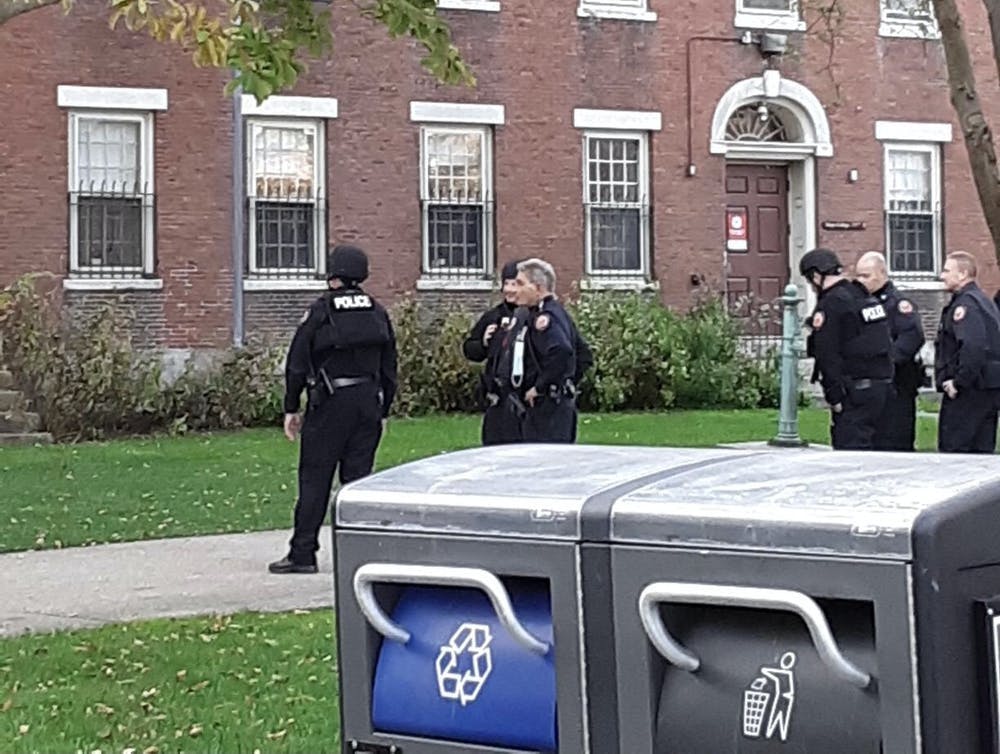A week after a bomb threat disrupted a quiet Sunday afternoon — and similar threats caused alarm at other Ivy League universities — the University is still looking for answers, and some community members still feel unsettled.
The University received an anonymous call of a bomb threat at 1:51 p.m. on Nov. 7, according to the Department of Public Safety crime log. Hope College was evacuated around 3 p.m., and the Rock and Hay libraries were evacuated about 45 minutes later, The Herald previously reported. Students were alerted by the Brown’s automated security alert system at 3:50 p.m.
DPS began to search the buildings before they were evacuated, said DPS Lieutenant John Carvalho. DPS decided to evacuate occupied buildings to accommodate K-9 unit searches, University Spokesperson Brian Clark wrote in an email to The Herald.
DPS’ response to the threat was informed by “myriad factors,” Clark wrote, such as specific details included in the call.
“DPS responded to the site and conducted searches during the immediate response and as additional resources quickly became available through the Providence Police, partnered on follow-up searches out of an abundance of caution,” Clark wrote.
As part of its ongoing investigation, the University is in contact with campus safety departments at other universities that received similar bomb threats, Clark wrote. It is also providing information to the Rhode Island State Fusion Center, a state police anti-terrorism group that coordinates private agencies as well as local, state and federal law enforcement, according to its website.
The anonymous call of a bomb threat prompted the Nov. 7 evacuation of buildings on the Main Green, the Rockefeller and Hay libraries, Lyman Hall and the List Art Center, The Herald previously reported. Around three hours after the evacuation, the threat was cleared by police.
Several peer institutions, including Cornell, Columbia and Yale, received similar threats last weekend. The threats continued throughout the week with the University of Chicago receiving a bomb threat Tuesday and Massachusetts Institute of Technology receiving a threat Thursday. New York University and the University of Southern California also received bomb threats Thursday.
The investigation into the threat on Brown’s campus is ongoing. Though DPS does not yet have a report ready for public release, Clark wrote in an email to The Herald that law enforcement “found no credible threat to the safety of our community members.”
The impact of the bomb threat on the Brown community continues to reverberate.
When retired DPS officer Lionel Butterfield heard about the bomb threat, he worried about his former colleagues. “When everyone else is walking out the door and told to go home and be safe, they’re going in,” he said. “I have nothing but respect for them.”
The threat also had effects on academic deadlines. In the wake of the threat, John Stein PhD ’95, senior lecturer in neuroscience, and Andrea Sobieraj, senior teaching associate in biology, extended the deadline on a BIOL 0800: “Principles of Physiology” exam by seven hours.
Stein said the exam window had just opened when affected buildings were evacuated. Some students had already started the exam and the evacuation interrupted their progress.
Sobieraj said she received about 20 emails from students who were worried about how the evacuation would affect their test-taking.
In addition to extending the deadline, Stein said he gave individual extensions to students who had already begun taking the exam.
The Office of Residential Life also offered support to students in Hope College, which was evacuated due to the threat.
The day after the bomb threat, Scott Helfrich, ResLife’s director of upper division houses, wrote an email to Hope College students. “Having talked with a few of you, I know that yesterday was filled with fear, concern for yourself and others, and in some cases, anger that someone used the threat of harm to violate your home and the larger Brown community,” he wrote in the email, which was reviewed by The Herald.
Helfrich offered to support the residents “in whatever way is best for” them.
Helfrich’s email was the only official communication Hope residents received besides the University’s alerts. “It’s been almost radio silence from the University itself,” said Heidi Schaefer ’24.
Schaefer said she is not as nervous about the threat as she was last weekend, but she’d still like to hear more about the investigation and its progress. “We deserve to be informed,” she said. “We’re paying to be here, we make up the student body and it impacts us.”
“Any student who needs support is encouraged to reach out to any of the wide ranges of resources available on campus — from Student Support Services to Counseling and Psychological Services to the Department of Public Safety itself, which engages with students directly and can of course also respond (or direct to the Administrator on Call) in the event of a need for emergency assistance,” Clark wrote.
Clark also added that the University will “consider the question of updates to members of the campus community” as the investigation progresses.
Jasper Chen ’24, another Hope resident, was not in the building at the time of the evacuation but was still concerned by the threat. “It made me feel like Brown was not a danger-free space,” he said. “I feel like anyone could do anything they wanted.”
Ran Zhang ’24, an international student from China, said her parents were especially concerned about her safety in the United States in light of the threat. Another Chinese student was recently killed at the University of Chicago, and her parents had heard about shootings in America, making the bomb threat particularly worrying.
But Zhang has no plans to go home and has not changed the amount of time she spends in her building. Still, now that Brown has been threatened, she said, it feels like “anything can happen.”





